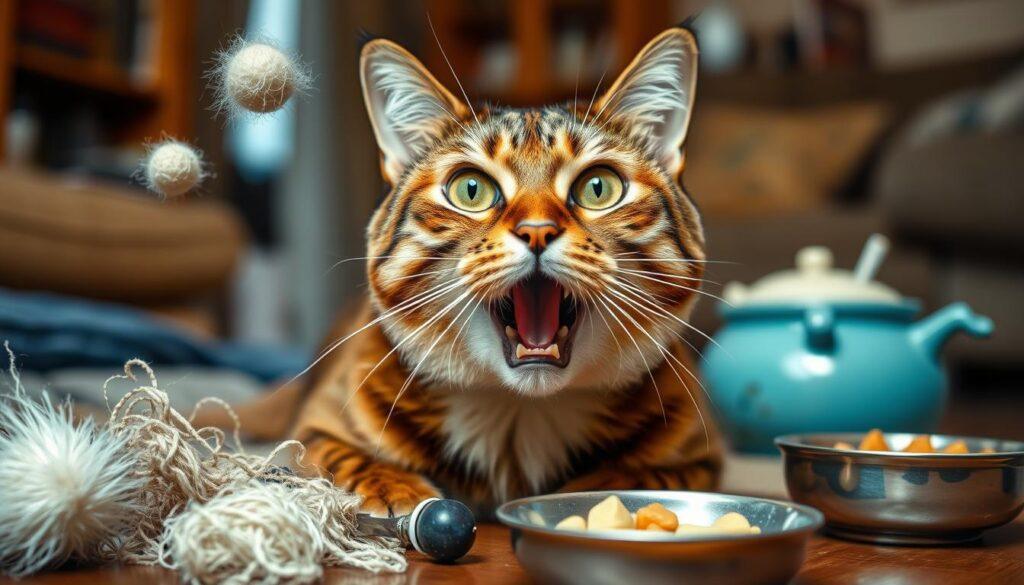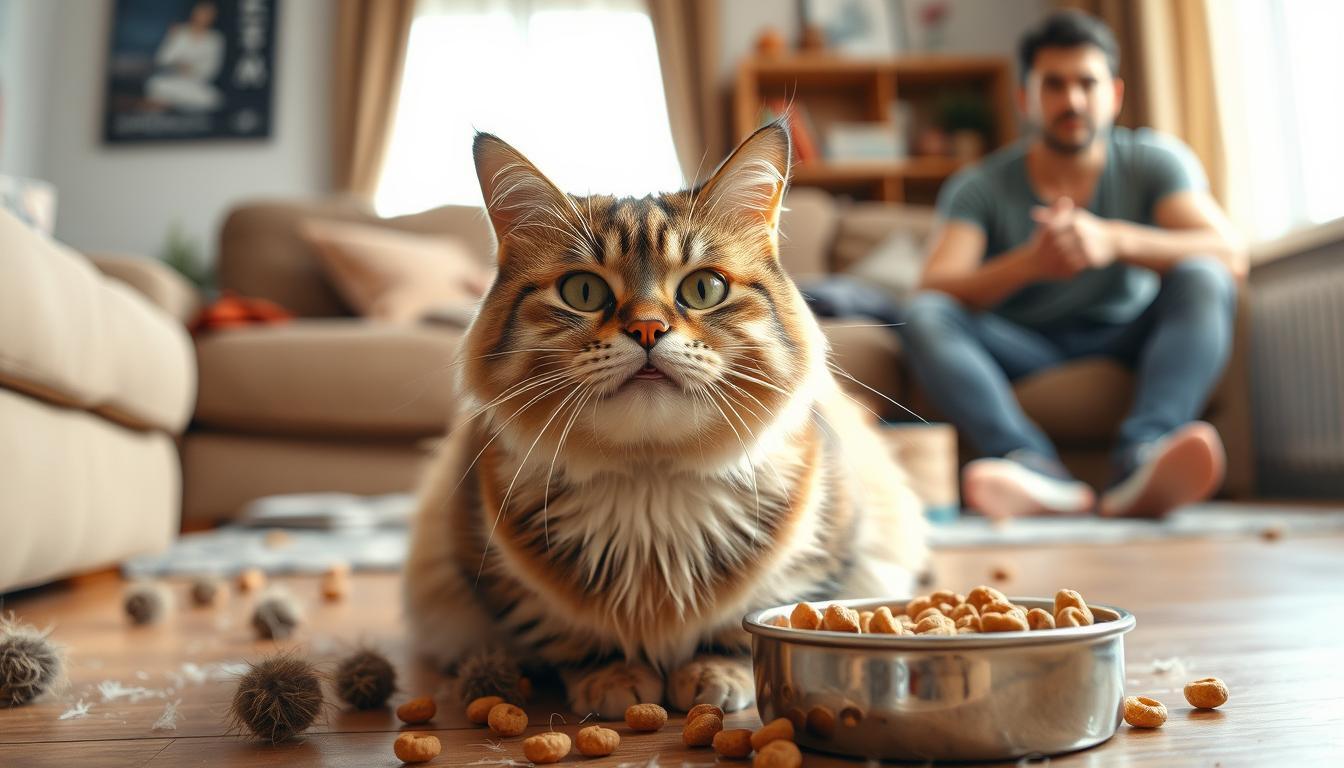Seeing your cat gag can be scary. Gagging is not always bad, but if it happens a lot, it might mean your cat is sick. Knowing why your cat is gagging is key to helping them feel better and getting them the help they need.
Hairballs are the main reason cats gag. Cats groom themselves a lot, which means they swallow hair. This hair can build up and cause hairballs. But, if your cat is gagging a lot or seems tired or hungry, there might be something else going on.
Cats that eat fast or swallow things they shouldn’t can also gag a lot. This is especially true for cats that are stressed or anxious. They might gobble their food down quickly. If your cat swallows something it shouldn’t, like a string or toy, it can also gag.
But sometimes, gagging can mean there’s a bigger problem. It could be something like allergies, a cold, dental issues, or even serious diseases like hyperthyroidism or kidney disease1.
To help your cat, you need to figure out why they’re gagging. You might need to change their food, groom them more to prevent hairballs, or use special feeders to slow them down2. If your cat keeps gagging or seems really sick, you should take them to the vet right away2.
Key Takeaways
- Occasional gagging in cats is not uncommon, but frequent or persistent gagging warrants attention.
- Hairballs, eating too quickly, and ingesting foreign objects are common causes of cat gagging.
- Underlying health issues like allergies, infections, or systemic diseases can also contribute to gagging.
- Identifying the cause and implementing appropriate treatment and prevention strategies are crucial.
- Seek veterinary care if gagging persists or is accompanied by other concerning symptoms.
Common Causes of Cat Gagging
Cats often gag due to different reasons. Sometimes, it’s normal, but other times, it might mean they’re sick. We’ll look at why cats gag, like hairballs, eating too fast, and swallowing things they shouldn’t.

Hairballs
Hairballs are a big reason for cat gagging. Cats groom themselves and swallow fur, which forms hairballs. These hairballs are vomited out, not coughed up, and can be a sign of health issues3. If your cat gags a lot before vomiting a hairball, or if they vomit hairballs often, see a vet.
Eating Too Quickly
Some cats gag because they eat too fast. They might be anxious about their food. To help, feed them slowly or use special bowls that make eating slower4. If your cat gags after eating, watch how they eat and change their routine if needed.
Ingesting Foreign Objects
Swallowing things they shouldn’t is a serious reason for cat gagging. Cats might vomit if they eat things like string or bones4. These can get stuck and cause big problems. Keep dangerous items away and get vet help if you think your cat ate something bad.
While hairballs, eating fast, and swallowing things are common reasons for cat gagging, there are others too. Gagging can also mean your cat has a health issue, like a cold or dental problems. We’ll talk about these in the next parts.
Health Issues That Can Cause Gagging in Cats
Hairballs, eating too fast, and swallowing foreign objects are common reasons for cat gagging. But, there are also health problems that can cause this symptom. These include allergies, respiratory infections, and dental issues.

Allergies
Allergies can make cats gag. If your cat has a bad post-nasal drip, they might gag while trying to swallow. This can also happen if they have a stuffy nose or other allergy symptoms. If your cat’s allergies are bad, talk to a vet about how to manage them.
Respiratory Infections
Coughing in cats can look like gagging. If your cat is trying to cough up a hairball, she might be coughing. This could mean she has asthma or lung disease5.
Heart disease can also cause gagging in cats, even without vomiting6. It’s a big problem, affecting up to 10% of cats. It can lead to coughing, breathing trouble, and other issues7.
Dental Problems
Dental issues like gingivitis and tooth problems can cause mouth pain and gagging. If your cat is gagging a lot and has bad breath or won’t eat, see a vet. They can check their teeth and find the right treatment.
| Health Issue | Symptoms | Prevalence |
|---|---|---|
| Allergies | Gagging, post-nasal drip, stuffy nose | Varies |
| Respiratory Infections | Coughing, gagging, difficulty breathing | Common |
| Dental Problems | Gagging, bad breath, drooling, reluctance to eat | Common |
| Heart Disease | Dry heaving, coughing, breathing difficulties, irregular heart rates, swollen abdomen | Affects up to 10% of cats7 |
If your cat keeps gagging, get them to the vet. They can find out why and treat it. Cats that don’t eat for 24 hours or have constant gagging need help fast5. Fixing the problem can make your cat feel better and avoid bigger problems.
Why Is My Cat Gagging
Seeing your cat gag can be worrying. Cats gag for many reasons, from hairballs to serious health problems8. Knowing why your cat gags helps you know when to see a vet and how to stop it from happening again.
Hairballs are a common reason for cat gagging. Cats get hairballs when they groom and swallow their fur. This fur builds up in their stomach and irritates it. Long-haired cats and those with stomach problems are more likely to get hairballs9. If your cat has a hairball, they might cough it up after trying a few times.
Eating too fast is another reason for cat gagging. Cats that eat too quickly can’t handle their food, leading to gagging or throwing up9. Using slow feeder bowls can help them eat slower8.
Gagging can also be a sign of a bigger health issue. If your cat gags a lot, it might mean they have a hairball, eating problem, or a disease like kidney disease8. Bad dental health can also cause gagging, drooling, and trouble swallowing9.
“Cats are masters at hiding illness, and gagging is often one of the first signs that something is wrong. It’s important to pay attention to your cat’s behavior and seek veterinary care if the gagging persists or is accompanied by other symptoms.” – Dr. Lori Teller, DVM
If your cat swallows something like string or yarn, they might gag because of a blockage9. If this happens, don’t try to take it out yourself. Call your vet right away for advice8.
If your cat’s gagging is bad or keeps happening, you need to see a vet8. Your vet might do tests like bloodwork and X-rays to find out why your cat is gagging9.
In short, cats gag for many reasons, from hairballs and eating too fast to serious health issues. By understanding these reasons and getting vet help when needed, you can keep your cat healthy and happy.
Distinguishing Between Coughing and Gagging in Cats
Coughing and gagging in cats are different actions with different causes. Coughing is when a cat forcefully pushes air out of its lungs, making a harsh sound. It helps clear the airways of irritants or foreign particles. In cats, coughing usually means there’s an airway disease10.
Common reasons for coughing in cats include asthma, parasitic infections like heartworms, allergies, and respiratory illnesses such as feline viral3.
Gagging, on the other hand, sounds like choking or retching. It means something might be blocking the cat’s throat. Unlike coughing, gagging is a sign of an airway blockage. This is a serious situation that needs quick vet help. Hairballs, a common cause of gagging, are actually from vomiting, not coughing3.
“Coughing in cats is a serious symptom that should not be ignored. It can indicate a variety of underlying health issues, from allergies to respiratory infections. If your cat is coughing persistently, it’s crucial to consult with your veterinarian for proper diagnosis and treatment.”
Younger cats, between 1-5 years old, are more likely to have feline asthma10. Older cats with health issues need careful watching when they cough10. Treatment for gagging and coughing depends on the cause. Antibiotics might be given for infections10. For asthma, corticosteroids are often used10. Cats with parasites like heartworms get special medications10.
Vets use X-rays, BAL, and blood tests to find the cause of gagging or coughing10. By knowing the difference between coughing and gagging, owners can get the right help for their cat.
When to Seek Veterinary Care for a Gagging Cat
While cats sometimes gag, especially with hairballs11, it’s not always normal. If your cat gags a lot, it might be a sign of a serious problem. It’s important to watch your cat and know when they need a vet.
Persistent Gagging
Seeing your cat gag a lot means you should get them to the vet. Gagging can mean many things, like breathing problems or even heart disease12. Your vet will do tests to find out why and help your cat feel better12.
Difficulty Breathing
If your cat can’t breathe while gagging, it’s very serious12. This could be because of something stuck in their throat or a bad allergy4. You need to get them to the vet fast to save their life.
Lethargy and Loss of Appetite
Gagging with no energy and no appetite is a big warning sign12. It could mean your cat has a serious illness like diabetes or kidney disease4. If your cat is gagging a lot and not eating, see a vet right away.
There are other times when you should take your cat to the vet:
- If your cat gags because of something they ate, like chocolate, go to the vet fast11.
- If your cat seems really upset, like pawing at their mouth, get help from a vet12.
- If your cat is gagging and also has diarrhea or vomiting, they need a vet12.
Even though cats sometimes gag normally11, don’t ignore it if it happens a lot. Knowing your cat’s habits and what they might be exposed to helps you know when to get help11. Always talk to your vet if you’re worried about your cat’s health.
Home Remedies and Prevention Strategies
If your cat is gagging a lot, there are ways to help. You can use cat gagging home remedies and prevention strategies. These can keep your cat’s digestive system healthy and reduce gagging.
Grooming to Reduce Hairballs
Longhaired cats like Persians and Maine Coons are more likely to get hairballs13. Cats that shed a lot or groom themselves too much are also at risk13. Regular grooming is key to prevent hairballs, especially for long-haired cats.
Brushing your cat’s coat daily removes loose fur before it’s swallowed. Use a de-shedding tool or a cat brush to get rid of extra hair.
Using hairball prevention products is also helpful. These products have ingredients that help hair pass through the digestive system. Grooming, fiber-rich diets, and special cat food can reduce hairballs in cats13.
Slow Feeders to Prevent Eating Too Quickly
Some cats eat too fast, leading to gagging and vomiting. Slow feeders or puzzle feeders can help. These bowls have designs that make cats eat slower.
Slow feeders encourage cats to eat more slowly. This can prevent gagging caused by eating too fast.
A slow feeder, such as a food dish with raised sections inside to create a maze-like shape, can encourage cats to slow down and work their way through their food carefully rather than eating it all at once.
Keeping Hazardous Objects Out of Reach
Cats are curious and might eat things they shouldn’t, like string or small toys. This can cause gagging, choking, or blockages. Keep dangerous objects away from your cat.
Check your home for hazards and store them safely. Also, give your cat toys made for cats, not small items that could choke them.
| Prevention Strategy | Benefits |
|---|---|
| Regular Grooming | Reduces hairball formation by removing loose fur |
| Slow Feeders | Encourages slower eating, preventing gagging from eating too quickly |
| Keeping Hazardous Objects Out of Reach | Prevents ingestion of foreign objects that can cause gagging or choking |
Using these cat gagging prevention strategies can help a lot. If your cat still gags a lot or shows other bad signs, see your vet. They can help figure out what’s wrong and treat it.
Conclusion
Knowing why your cat is gagging is key to their health. From simple hairballs to serious health problems, it’s important to know the reasons. Cats often get hairballs, which can make them gag11. They might also gag from eating things they shouldn’t, like insects or household items11.
Signs of choking in cats include gagging, pawing at their mouth, and drooling a lot14. They might also have trouble breathing, act panicked, vomit, or even pass out14.
If your cat keeps gagging, get them to the vet fast. The vet can find out why and treat it. You can also try home remedies and prevent gagging by grooming your cat regularly and keeping dangerous items away.
Some cats gag because of health issues like asthma or stomach problems15. Treatment might include changing their diet, giving them medicine, or even surgery to remove something stuck in their throat15.
As a cat owner, watch your cat closely and act fast if needed. Knowing why cats gag, spotting the signs, and taking steps to prevent it can keep them healthy and happy. Keep an eye on how often they gag and watch for other signs like changes in appetite or diarrhea15.
Always put your cat’s health first. Working with your vet ensures they get the best care.
FAQ
What are the most common causes of cat gagging?
Can allergies cause my cat to gag?
How can I tell the difference between coughing and gagging in my cat?
When should I seek veterinary care for my gagging cat?
What home remedies can I use to prevent my cat from gagging?
How can I help my cat with hairballs to reduce gagging?
Source Links
- 6 Reasons Why Your Cat is Gagging | Frontier Veterinary Urgent Care – https://frontierveturgentcare.com/blog/cat-gagging-milwaukee-wi/
- Cat Gagging: Causes and What to Do | Veterinary Emergency Group – https://veterinaryemergencygroup.com/blog/cat-gagging/
- Coughing Versus Vomiting: Why Does My Cat Do That? – Just Cats Clinic – https://justcatsclinic.com/coughing-versus-vomiting-why-does-my-cat-do-that/
- Why Is My Cat Gagging? – North Kenny Veterinary Hospital – https://northkennyvet.com/blog/cat-gagging/
- Gagging And Dry Heaves (Unproductive Vomiting) In Cats – Causes, Treatment And Associated Symptoms – Vetster – https://vetster.com/en/symptoms/cat/gagging-and-dry-heaves-unproductive-vomiting
- Why Does My Cat Keep Gagging? | Orlando Vets – https://www.orlandovets.com/blog/cat-gagging/
- Why is my cat dry heaving? – https://wagwalking.com/cat/symptom/why-is-my-cat-dry-heaving
- What Causes Cat Gagging and What to Do – Cats.com – https://cats.com/cat-gagging
- Why Is Your Cat Gagging? – https://www.kinship.com/cat-health/cat-gagging
- Coughing In Cats: When To Worry And What To Do About Cat Cough | Kingsdale Animal Hospital – https://www.kingsdale.com/coughing-in-cats-when-to-worry-and-what-to-do
- Cat Gagging – https://www.innovetpet.com/blogs/recent-articles/cat-gagging
- Gagging in cats | Joii Pet Care – https://www.joiipetcare.com/health-conditions/cat/gagging/
- What to Do About Hairballs in Cats – https://www.webmd.com/pets/cats/what-to-do-about-hairballs-in-cats
- Cat Choking: Identifying the Signs and How to Respond – https://cprcertificationnow.com/blogs/mycpr-now-blog/cat-choking-identifying-the-signs-and-how-to-respond
- Why is Your Cat Dry Heaving? Understanding the Causes and Solutions – https://mywaggle.com/blogs/pet-health/why-is-your-cat-dry-heaving-understanding-the-causes-and-solutions?srsltid=AfmBOopa9RHqqqS3at84in0keZLrZerPF2Bs2DbNp-DTRHVMOoKQdKof

